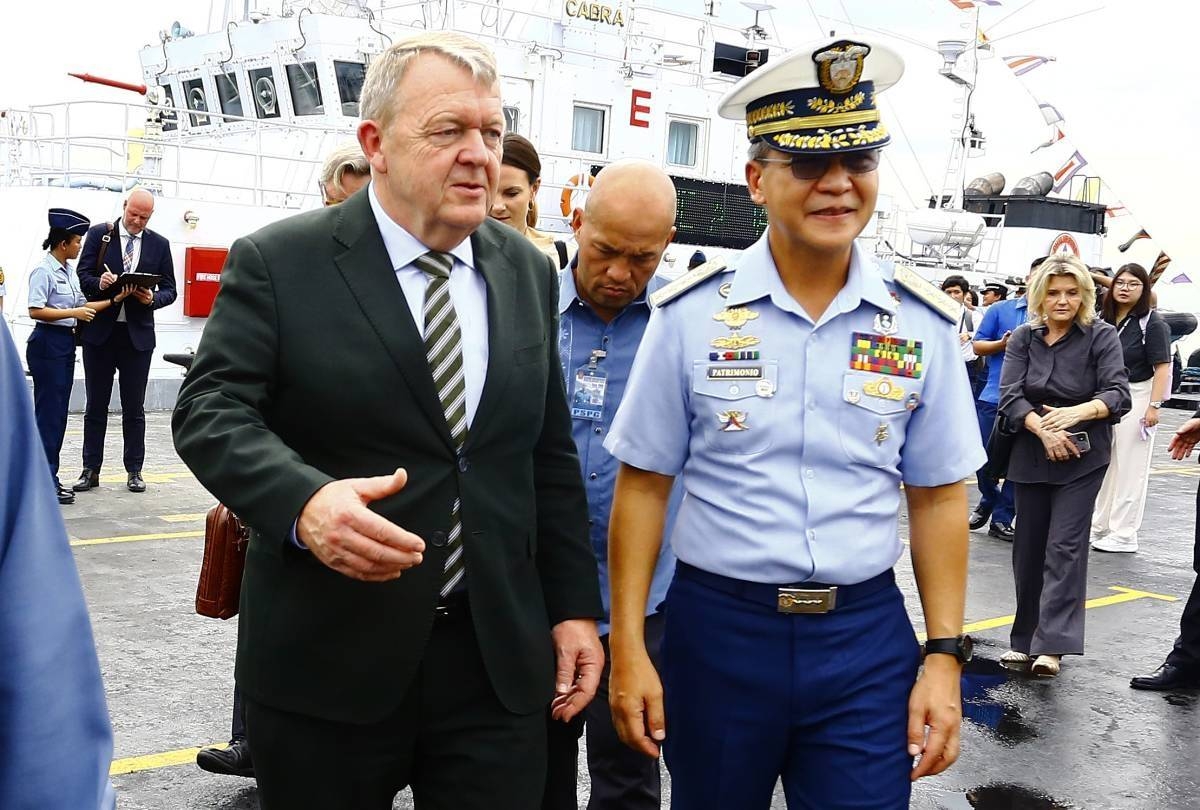Denmark eyes military exercises with Philippines
DENMARK is open to holding joint military exercises with the Philippines. Danmark's Foreign Minister Lars Løkke Rasmussen raised the possibility on Monday during his visit to the Philippine Coast Guard (PCG) national headquarters in Manila. Rasmussen underscored the importance of collaboration in ensuring freedom of navigation in international waters. "We should always have an open eye," he said, emphasizing that "freedom to navigate is crucial for us and for everybody." During his visit to the PCG, Rasmussen was briefed on the Philippines' maritime challenges, including recurring confrontations with the China Coast Guard (CCG) in disputed waters and an overview of their capabilities and challenges. The PCG has increasingly been at the forefront in countering aggressive actions by larger, better-equipped foreign fleets in the West Philippine Sea. However, it has been saddled with operational constraints, including limited assets and personnel. "I am here to witness first-hand the challenges faced by the Philippines in upholding its own territory and the incidents with the China Coast Guard," Rasmussen said. "Denmark is exploring what it can do to support the Philippines in these efforts." His visit comes as Denmark prepares to assume a seat on the United Nations Security Council in 2025. This position bolsters Denmark's platform to advocate for adherence to international maritime law, particularly the United Nations Convention on the Law of the Sea (Unclos). "Generally, we speak up in all international fora wherever we have the opportunity to underline the importance of upholding international law," the Danish minister said. He highlighted Denmark's approach to both diplomatic advocacy and, where appropriate, operational involvement. Referring to international maritime conflicts like those in the Red Sea, Rasmussen suggested Denmark could take a similar role in Asia. "We advocate that all countries must comply with the conventions, and in certain situations, we can actually join in a more operational manner," Rasmussen said. He said the international community must work together to uphold the rules-based order.

DENMARK is open to holding joint military exercises with the Philippines.
Danmark's Foreign Minister Lars Løkke Rasmussen raised the possibility on Monday during his visit to the Philippine Coast Guard (PCG) national headquarters in Manila.
Rasmussen underscored the importance of collaboration in ensuring freedom of navigation in international waters.
"We should always have an open eye," he said, emphasizing that "freedom to navigate is crucial for us and for everybody."
During his visit to the PCG, Rasmussen was briefed on the Philippines' maritime challenges, including recurring confrontations with the China Coast Guard (CCG) in disputed waters and an overview of their capabilities and challenges.
The PCG has increasingly been at the forefront in countering aggressive actions by larger, better-equipped foreign fleets in the West Philippine Sea. However, it has been saddled with operational constraints, including limited assets and personnel.
"I am here to witness first-hand the challenges faced by the Philippines in upholding its own territory and the incidents with the China Coast Guard," Rasmussen said. "Denmark is exploring what it can do to support the Philippines in these efforts."
His visit comes as Denmark prepares to assume a seat on the United Nations Security Council in 2025. This position bolsters Denmark's platform to advocate for adherence to international maritime law, particularly the United Nations Convention on the Law of the Sea (Unclos).
"Generally, we speak up in all international fora wherever we have the opportunity to underline the importance of upholding international law," the Danish minister said.
He highlighted Denmark's approach to both diplomatic advocacy and, where appropriate, operational involvement. Referring to international maritime conflicts like those in the Red Sea, Rasmussen suggested Denmark could take a similar role in Asia.
"We advocate that all countries must comply with the conventions, and in certain situations, we can actually join in a more operational manner," Rasmussen said.
He said the international community must work together to uphold the rules-based order.
















